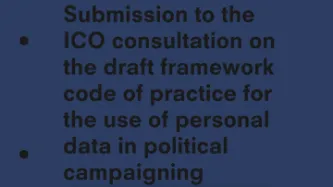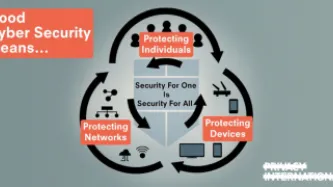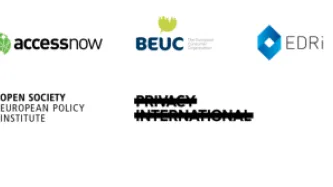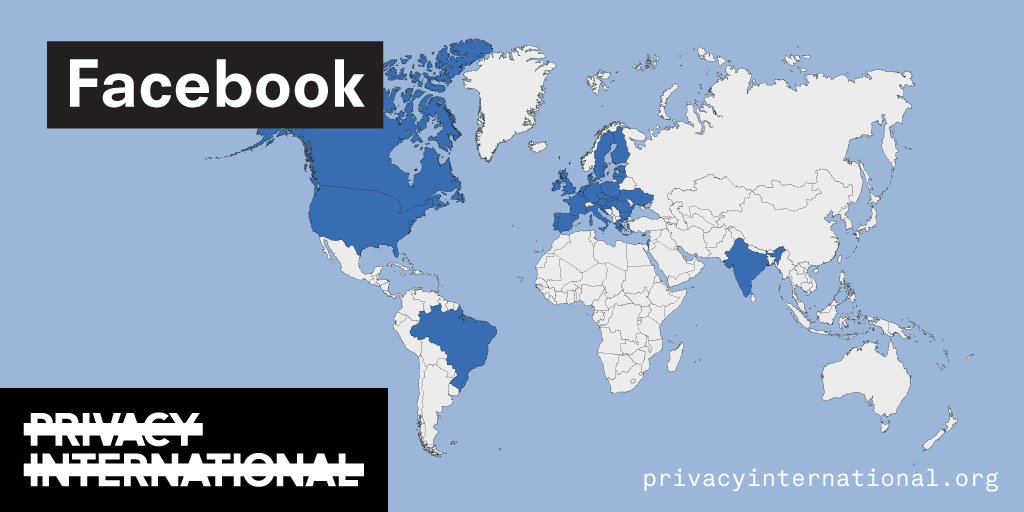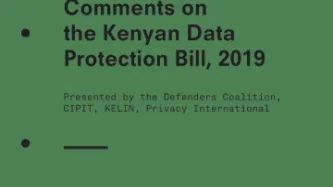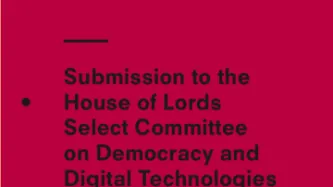Advanced Search
Content Type: Advocacy
On November 1, 2019, we submitted evidence to an inquiry carried out by the Scottish Parliament into the use of Facial Recognition Technology (FRT) for policing purposes.
In our submissions, we noted that the rapid advances in the field of artificial intelligence and machine learning, and the deployment of new technologies that seek to analyse, identify, profile and predict, by police, have and will continue to have a seismic impact on the way society is policed.
The implications come not…
Content Type: Long Read
Sitting on the ground inside an unadorned courtyard in Koira Tegui, one of Niamey’s most popular districts, Halimatou Hamadou shows a copy of what, she’s been told, is a certificate of birth.
The 33 year old woman, who’s unable to read and write, received it days earlier during a crowded public ceremony at a nearby primary school.
“It’s my first document ever,'' she says, with surprise.
Thanks to the paper, she’ll be able to take part in a crucial passage for the future of Niger: the…
Content Type: Financial Report
Audited accounts for the year ending January 31, 2019.
Content Type: Press release
Privacy International, Open Rights Group, the Institute for Strategic Dialogue, Fair Vote, Who Targets Me? and Demos have today written to all the main UK political parties, demanding that they are transparent with the public about how they are using voters’ personal data in their electioneering. Twitter's announcement yesterday of their ban on political advertising is just the latest wake up call to politicians about the risks to democracy of personal data driven microtargeting of political…
Content Type: Advocacy
In October 2019, PI responded to the UK Information Commissioner’s (ICO) consultation on a draft Code of Practice for the use of personal data in political campaigning.
This follows on from PI's submission in December 2018, to the ICO’s Call for Views.
PI welcomes the draft Code of Practice as a first step. However, much remains to be done to close the implementation and enforcement gap and strengthen existing regulatory frameworks.
In response to the ICO’s questions, PI’s submission…
Content Type: News & Analysis
Privacy International has been doing work on the UK-based digital identity company, Yoti. We have raised concerns about their use of user data for their 'Yoti Age Scan' product. As we say in our analysis:
Yoti Age Scan is just one example of digital identity. The issues ... can be used to reflect on wider issues relating to the use of data gathered in the course of identity services: how do we want the identity industry to treat our data? What is the future for this market, and how do we…
Content Type: Long Read
The pressing need to fix our cybersecurity (mis)understandings
Despite all the efforts made so far by different, cybersecurity remains a disputed concept. Some states are still approving cybersecurity laws as an excuse to increase their surveillance powers. Despite cybersecurity and cybercrime being different concepts, the confusion between them and the broad application of criminal statutes is still leading to the criminalise legitimate behaviour.
All of this represents a sizable challenge…
Content Type: News & Analysis
CC: BY (Kirill Sharkovski)-SA
Este artículo fue escrito por Jamila Venturini, Coordinadora regional de Derechos Digitales. El artículo fue publicado por primera vez aquí. This article is available in English.
La implementación de programas que condicionan el acceso a servicios básicos por medio de vigilancia estatal y privada agudizan la inequidad imperante en el continente.
Mientras la brecha entre ricos y pobres se incrementa en el mundo, América Latina sigue siendo la región donde la…
Content Type: News & Analysis
Picture: CC: BY (Kirill Sharkovski)-SA
This article was written by Jamila Venturini from Derechos Digitales. The original version (in Spanish) is available here.
How implementing social protection programmes that condition access to basic services to state and private surveillance exacerbate the prevailing inequality on the continent.
While the gap between rich and poor is increasing in the world, Latin America remains the most unequal region of the world. According to the Economic…
Content Type: News & Analysis
Photo by Ray Witlin / World Bank CC BY-NC-ND 2.0
This article has been written by Ambika Tandon, Policy Officer at the Centre for Internet and Society, in collaboration with Privacy International.
On October 17th 2019, the UN Special Rapporteur (UNSR) on Extreme Poverty and Human Rights, Philip Alston, released his thematic report on digital technology, social protection and human rights. Understanding the impact of technology on the provision of social protection – and, by extent, its…
Content Type: Press release
Tomorrow, the UN Special Rapporteur on extreme poverty and human rights will present his annual report to the UN General Assembly in New York on digital technology, social protection and human rights. On the same day, Privacy International will be launching its own series on surveillance in the provision of social services.
The Special Rapporteur warns that specific areas need to be addressed to "avoid stumbling zombie-like into a digital welfare dystopia" and that "values such as…
Content Type: Long Read
This research is the result of a collaboration between Grace Tillyard, a doctoral researcher in the Media, Communications and Cultural Studies department at Goldsmiths College, London, and Privacy International.
Social Protection Systems in the Digital Age
In the digital age, governments across the world are building technologically integrated programmes to allow citizens to access welfare payments. While smart and digital technologies hold the potential to streamline administrative…
Content Type: News & Analysis
Photo by VanveenJF on Unsplash
Last week, Amnesty International published a report revealing the Moroccan government appears to have been using spyware from Israeli company NSO Group against two human rights defenders, historian and columnist Maati Monjib and lawyer Abdessadak El Bouchattaoui.
In order for the government to gain control over their phones, Monjib and El Bouchattaoui had to click on a malicious link which would install NSO Group’s Pegasus spyware. NSO therefore has to craft…
Content Type: Long Read
[Photo credit: Images Money]
The global counter-terrorism agenda is driven by a group of powerful governments and industry with a vested political and economic interest in pushing for security solutions that increasingly rely on surveillance technologies at the expenses of human rights.
To facilitate the adoption of these measures, a plethora of bodies, groups and networks of governments and other interested private stakeholders develop norms, standards and ‘good practices’ which often end up…
Content Type: Advocacy
In this submission, Privacy International aims to provide the Office of the UN High Commissioner for Human Rights with information on how surveillance technologies are affecting the right to peaceful protests in new and often unregulated ways.
Based on Privacy International’s research, we provide observations, regarding the following:
the relationship between peaceful protests and the right to privacy;
the impact of new surveillance technologies in the context of peaceful protests…
Content Type: Long Read
In this piece we examine mobile phone extraction, relying on publicly available information and Privacy International’s experience from conducting mobile phone extraction using a Cellebrite UFED Touch 2. We welcome input from experts in the field. This is a rapidly developing area. Just as new security features are announced for phones, so too new methods to extract data are found.
[All references can be found in the pdf version below.]
General explanation of mobile phone…
Content Type: News & Analysis
On 11 October 2019, Privacy International together with EDRi, BEUC, AccessNow and Open Society European Policy Institute, sent an open letter to EU Member States, to urge them to conclude the negotiations on the ePrivacy Regulation.
The letter highlights the urgent need for a strong ePrivacy Regulation in order to tackle the problems created by the commercial surveillance business models, and expresses the deep concerns by the fact that the Member States, represented in the Council of the…
Content Type: Long Read
Photo by Nadine Shaabana on Unsplash
Digital identity providers
Around the world, we are seeing the growth of digital IDs, and companies looking to offer ways for people to prove their identity online and off. The UK is no exception; indeed, the trade body for the UK tech industry is calling for the development of a “digital identity ecosystem”, with private companies providing a key role. Having a role for private companies in this sector is not necessarily a problem: after all, …
Content Type: News & Analysis
The latest news of Twitter “inadvertently” sharing email addresses or phone numbers provided for safety or security purposes (for example, two-factor authentication) for advertising purposes is extremely concerning for several reasons.
First of all, it is not the first time for Twitter's used people's data in ways they wouldn't expect or that ignores their choices: in August, the company disclosed that it may have shared data on users with advertising partners, even if they had opted out from…
Content Type: News & Analysis
Photo by Daniel Jensen on Unsplash
Everyone is talking about Facebook's end-to-end encryption plans and the US, UK and Australian government's response. Feeling lost? Here is what you need to know.
What's Facebook trying to do?
First let's be clear: Facebook has many faults when it comes to privacy. It's also suffered a number of security failures recently. See here for instance.
In response to their successive failures to protect your privacy, Facebook announced in their 'pivot to privacy…
Content Type: News & Analysis
Today’s announcement regarding the UK and US agreement signed pursuant to the US CLOUD Act is being touted on both sides of the Atlantic as a major victory for law enforcement and security. But it is a step backward for privacy.
And it’s far more complicated than their press release and letter to industry.
The agreement replaces the prior system, under which law enforcement agencies from around the world, including the UK, had to meet US legal standards in order to get access to content held…
Content Type: Long Read
An analysis of what Facebook, Google, and Twitter have done to provide users with political ad transparency as of September 2019. Our full analysis is linked below.
Recently the role of social media and search platforms in political campaigning and elections has come under scrutiny. Concerns range from the spread of disinformation, to profiling of users without their knowledge, to micro-targeting of users with tailored messages, to interference by foreign entities, and more. Significant…
Content Type: Examples
Rewire.News has reported that Google apparently remains unwilling to differentiate its Maps search results between clinics in the US that offer abortion care and faith-based organisations that do not provide abortion care.
Rewire.News reports that, in contrast Yelp "made a concerted effort" to ensure that the company differentiated between faith-based centres, also known as crisis pregnancy centres in the US, and medical facilities that provided medical reproductive healthcare, including…
Content Type: Advocacy
We welcome the effort by the Government of Kenya to give life to and specify the right to privacy, already enshrined in Article 31(c) and (d) of the Constitution of Kenya by proposing a draft Data Protection Act. We particularly appreciate the direct reference to this Constitutional right in the purpose of the Act and the way it is referred to on several occasions in this proposed Bill.
Development of an effective and comprehensive Data Protection law in Kenya is a priority. In…
Content Type: News & Analysis
A new UK Times report claims that “WhatsApp, Facebook and other social media platforms will be forced to disclose encrypted messages from suspected terrorists, paedophiles and other serious criminals under a new treaty between the UK and the US.”
Several other media outlets have followed up on the report, with headlines such as “UK and US set to sign treaty allowing UK police ‘back door’ access to WhatsApp and other ‘end to end encrypted’ messaging platforms”.
While the…
Content Type: Advocacy
PI is increasingly concerned that democratic participation can be inhibited by novel and unhindered surveillance both by governments and companies. To safeguard our rights, earlier this year, we launched our work programme, Defending Democracy and Dissent, which aims to investigate the role technology plays in facilitating and/or hindering everyone's participation in civic society.
This submission to the House of Lords covers PI’s views on:
How digital tech has changed the way…
Content Type: Long Read


